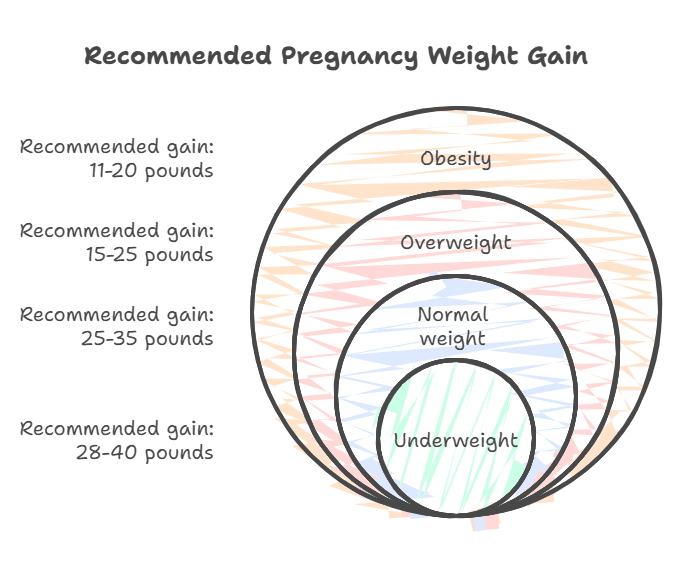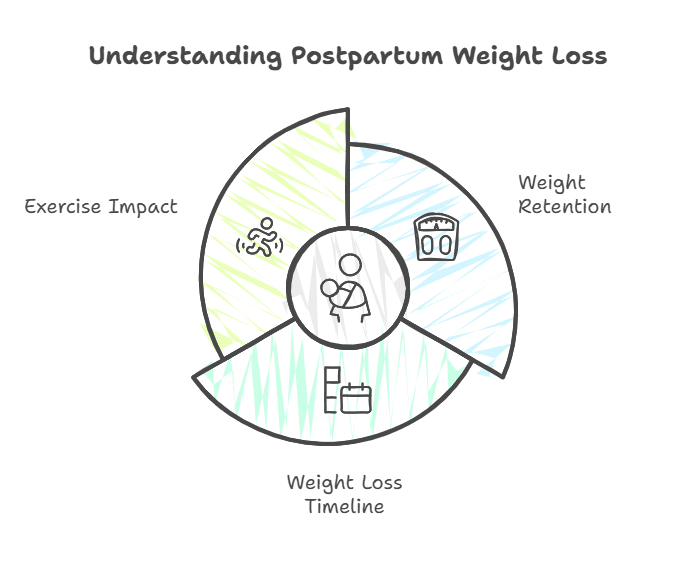Pregnancy is a beautiful journey, but it often comes with significant changes to a woman’s body. Many new mothers find themselves eager to shed the extra pounds gained during pregnancy, leading to a surge in interest around the topic of rapid weight loss after pregnancy. This blog post will explore effective strategies, share relevant statistics, and provide motivation for those looking to unlock their dream body post-baby.

Understanding Weight Gain During Pregnancy
Before diving into weight loss strategies, it’s essential to understand how much weight is typically gained during pregnancy. According to the American College of Obstetricians and Gynecologists (ACOG), the recommended weight gain during pregnancy varies based on a woman’s pre-pregnancy body mass index (BMI):
- Underweight (BMI < 18.5): 28-40 pounds
- Normal weight (BMI 18.5-24.9): 25-35 pounds
- Overweight (BMI 25-29.9): 15-25 pounds
- Obesity (BMI ≥ 30): 11-20 pounds

These numbers can serve as a benchmark for new mothers as they navigate their postpartum weight loss journey.
The Importance of a Healthy Approach
While the desire for rapid weight loss after pregnancy is common, it’s crucial to approach this goal with a focus on health. Rapid weight loss can lead to muscle loss, nutritional deficiencies, and other health issues. According to a study published in the journal Obesity, women who lost weight too quickly postpartum were more likely to regain it later. Therefore, a balanced approach is vital.
Statistics on Postpartum Weight Loss
- Weight Retention: Research indicates that approximately 50% of women retain more than 10 pounds of weight one year after giving birth.
- Weight Loss Timeline: A study in the American Journal of Clinical Nutrition found that most women lose about 70% of their pregnancy weight by six months postpartum, but the remaining weight can take longer to shed.
- Exercise Impact: According to the Journal of Women’s Health, women who engage in regular physical activity postpartum are more likely to achieve their weight loss goals compared to those who do not exercise.

Rapid Weight Loss After Pregnancy : Setting Realistic Goals
Achieving rapid weight loss after pregnancy requires a balanced and realistic approach to ensure both physical health and emotional well-being. Setting achievable goals is crucial to maintaining motivation and preventing unnecessary stress.
According to the Centers for Disease Control and Prevention (CDC), a safe and sustainable weight loss rate is 1-2 pounds per week. While it may be tempting to aim for faster results, gradual weight loss is more effective in the long run and allows the body to recover properly from childbirth.
By setting realistic expectations, new mothers can focus on building healthier habits rather than resorting to extreme diets or excessive exercise. A steady approach helps regulate hormones, preserve muscle mass, and maintain energy levels—crucial for caring for a newborn.
Tips for Setting Achievable Weight Loss Goals:
Be patient and kind to yourself—every postpartum journey is unique.
Prioritize overall health over rapid weight loss.
Set small, measurable milestones to track progress.
Listen to your body and adjust goals as needed.
Seek professional guidance from a healthcare provider or nutritionist.
Nutrition: The Foundation of Weight Loss
1. Balanced Diet
A balanced diet rich in whole foods is crucial for rapid weight loss after pregnancy. Focus on:
- Fruits and Vegetables: Aim for a variety of colors and types to ensure a broad range of nutrients.
- Lean Proteins: Incorporate sources like chicken, fish, beans, and legumes to support muscle recovery.
- Whole Grains: Choose whole grains over refined grains to maintain energy levels and promote satiety.
2. Hydration
Staying hydrated is vital for overall health and can aid in weight loss. Drinking water can help control hunger and improve metabolism. Aim for at least 8-10 glasses of water daily, and consider incorporating herbal teas for variety.
3. Mindful Eating
Practicing mindful eating can help new mothers develop a healthier relationship with food. This involves paying attention to hunger cues, savoring each bite, and avoiding distractions during meals.
Rapid Weight Loss After Pregnancy : Exercise: A Key Component
1. Postpartum Exercise Guidelines
The CDC recommends that new mothers engage in at least 150 minutes of moderate-intensity aerobic activity per week, along with strength training exercises on two or more days. However, it’s essential to consult with a healthcare provider before starting any exercise regimen.
2. Types of Exercises
- Walking: A simple yet effective way to ease back into fitness. Start with short walks and gradually increase duration and intensity.
- Strength Training: Incorporate bodyweight exercises like squats, lunges, and push-ups to build muscle and boost metabolism.
- Yoga and Pilates: These practices can enhance flexibility, core strength, and mental well-being, making them excellent choices for postpartum recovery.
3. Finding Support
Joining a postpartum exercise class or finding a workout buddy can provide motivation and accountability. Many communities offer programs specifically designed for new mothers, making it easier to stay active.
Rapid Weight Loss After Pregnancy : Mental Health Matters
The postpartum period can be emotionally challenging, and mental health plays a significant role in weight loss success. According to the American Psychological Association, women who experience postpartum depression may struggle with weight loss. It’s essential to prioritize mental well-being through:
- Self-Care: Take time for yourself, whether it’s through hobbies, relaxation, or socializing.
- Support Networks: Lean on family, friends, or support groups to share experiences and feelings.
- Professional Help: If feelings of sadness or anxiety persist, consider seeking help from a mental health professional.
Rapid Weight Loss After Pregnancy : The Role of Sleep
Sleep deprivation is common among new parents and can hinder weight loss efforts. According to the National Sleep Foundation, lack of sleep can disrupt hormones that regulate appetite, leading to increased cravings and weight gain. Strategies to improve sleep include:
- Establishing a Routine: Try to go to bed and wake up at the same time each day.
- Creating a Sleep-Friendly Environment: Keep the bedroom dark, quiet, and cool to promote better sleep quality.
- Napping When Possible: Take advantage of nap times to catch up on sleep.
Success Stories and Inspiration
Hearing success stories from other mothers can be incredibly motivating. Many women have shared their journeys of rapid weight loss after pregnancy through blogs, social media, and support groups. These stories often highlight the importance of perseverance, self-love, and the understanding that every body is unique.
Achieving rapid weight loss after pregnancy is a journey that requires patience, dedication, and a focus on health. By setting realistic goals, adopting a balanced diet, engaging in regular exercise, and prioritizing mental well-being, new mothers can unlock their dream bodies while embracing the beautiful changes that motherhood brings. Remember, the goal is not just to lose weight but to cultivate a healthy lifestyle that supports both you and your family.





